

Antarctic ice shelf thinning speeds up - BBC News. Scientists have their best view yet of the status of Antarctica's floating ice shelves and they find them to be thinning at an accelerating rate.
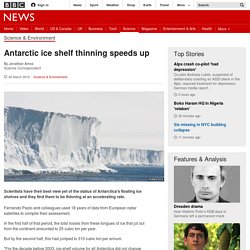
Fernando Paolo and colleagues used 18 years of data from European radar satellites to compile their assessment. In the first half of that period, the total losses from these tongues of ice that jut out from the continent amounted to 25 cubic km per year. But by the second half, this had jumped to 310 cubic km per annum. "For the decade before 2003, ice-shelf volume for all Antarctica did not change much," said Mr Paolo from the Scripps Institution of Oceanography in San Diego, US.
"Since then, volume loss has been significant. The satellite research is published in Science Magazine. Faster flow. The melting of Antarctica was already really bad. It just got worse. A satellite view of Antarctica is seen in this undated NASA handout photo obtained by Reuters on Feb. 6, 2012.
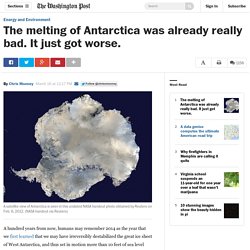
(NASA handout via Reuters) A hundred years from now, humans may remember 2014 as the year that we first learned that we may have irreversibly destabilized the great ice sheet of West Antarctica, and thus set in motion more than 10 feet of sea level rise. Sec. Albright & Sec. Shultz On National Security, Climate Change & the Arctic. The U.S.

Senate Armed Services Committee (SASC) held an all-star hearing on January 29th, titled “Global Challenges and the U.S. National Security Strategy.” Witnesses included three former Secretaries of State: Dr. The end and beginning of the Arctic. The Race To Claim the North Pole Is Heating Up. The race for ownership of the North Pole is heating up.
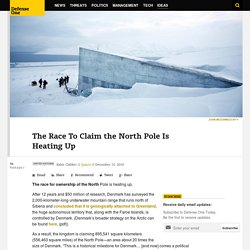
After 12 years and $50 million of research, Denmark has surveyed the 2,000-kilometer-long underwater mountain range that runs north of Siberia and concluded that it is geologically attached to Greenland, the huge autonomous territory that, along with the Faroe Islands, is controlled by Denmark. (Denmark’s broader strategy on the Arctic can be found here. (pdf)) As a result, the kingdom is claiming 895,541 square kilometers (556,463 square miles) of the North Pole—an area about 20 times the size of Denmark.
Melting Arctic Warms up Cold War. This image made available by the Norwegian Military on Thursday, June 5, 2014 shows a Norwegian vessel passing through the Bosporus in Istanbul Turkey, on March 2, 2014.
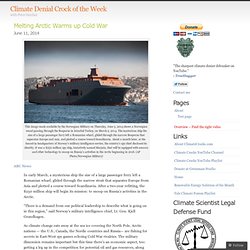
Russian military forming drone squadron for Arctic reconnaisance. MOSCOW, November 13.
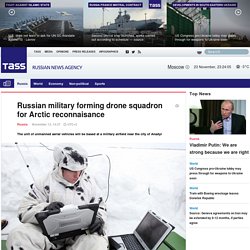
/TASS/. Military chiefs in eastern Russia are assembling a drone squadron operating from the Arctic region's autonomous Chukotka region, spokesman Colonel Alexander Gordeyev told TASS on Thursday. The unit of unmanned aerial vehicles will be based at a military airfield near the city of Anadyr, staffed exclusively by contract servicemen, he said. They will ensure sea navigation security and conduct coastal air reconnaissance over Russian territorial waters.
U.S. Navy eyes greater presence in Arctic. Source: Yahoo The U.S.

Navy is mapping out how to expand its presence in the Arctic beginning about 2020, given signs that the region’s once permanent ice cover is melting faster than expected, which is likely to trigger more traffic, fishing and resource mining. “The Arctic is all about operating forward and being ready. We don’t think we’re going to have to do war-fighting up there, but we have to be ready,” said Rear Admiral Jonathan White, the Navy’s top oceanographer and navigator, and director of the Navy’s climate change task force. “We don’t want to have a demand for the Navy to operate up there, and have to say, ‘Sorry, we can’t go,’” he said. Analysis - Arctic Steampunk: The New Age of Cold Weather Data Infrastructure. By Scott Smith Exploring Arctic and near-Arctic solutions to global demand for faster, cheaper and more sustainable data storage and computing infrastructure.

Even as miles physically travelled are decreasing globally, the ability to generate a different kind of traffic—from data—is starting to shape geography in ways not usually associated with virtual worlds. Another Arctic Spill Is Inevitable, and We Are in No Way Prepared. The relentless search for new oil sources and increasingly ice-free seas are setting the stage for a petroleum gold rush in the Arctic.

And with expensive, risky deepwater drilling in harsh seas will come inevitable oil spills—spills that the industry and regulators aren't ready to handle. That's the finding of a broad study from the National Research Council that surveyed the future of Arctic oil exploration. The lengthy report looks at a wide variety of potential scenarios, and comes to a stark conclusion: As oil and shipping companies begin to invest in the Arctic, there isn't enough research examining how the Arctic is changing and how to respond to oil spills in such a unique environment.
And there currently aren't enough resources in place for spill response, either. Russia Ships The World's First Load of Offshore Arctic Oil. Russia has announced its first shipment of Arctic offshore oil.
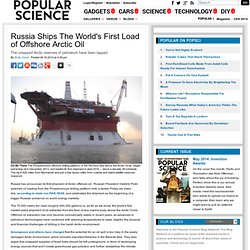
Russian President Vladimir Putin watched oil loading from the Prirazlomnoye drilling platform onto a tanker Friday via video link, according to state-run ITAR-TASS, and celebrated the shipment as the beginning of a bigger Russian presence on world energy markets.
Methane release. MAPS. Arctic online resources. Countries. Politics. Geostrategic dimensions. NGOs & Activists. Companies.